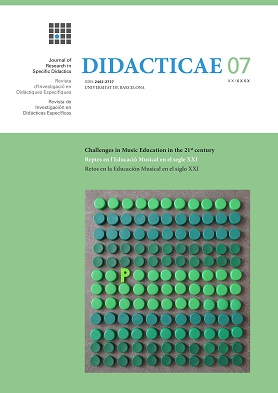Adaptación del "Marco Común de Competencia Digital Docente" al área de Educación Musical
Adaptation of the "Common Framework of Digital Teaching Competence" to the area of Music Education
DOI:
https://doi.org/10.1344/did.2020.7.74-85Keywords:
digital teaching competence, "Common Framework of Digital Teaching Competence", INTEF, music teaching, digital technologyAbstract
In 2017, the National Institute of Educational Technologies and Teacher Training (INTEF) proposed the "Common Framework of Digital Teaching Competence", composed of five areas and between three and six competencies in each of them, as a benchmark of the Digital Teaching Competence (DTC). This paper makes an adaptation of each area and competence defined by the INTEF to the field of music education. This adaptation makes it easier for teachers to self-evaluate the DTC itself as well as being a reference for the definition of continuous and initial training actions for the Music teacher.References
Bauman, Z. (2005). Los retos de la educación en la modernidad líquida. Barcelona: Gedisa.
Belletich, O., Angel-Alvarado, R., y Wilhelmi, M. R. (2017). Epistemic norms in the musical training for primary teacher education. Journal for Educators, Teachers and Trainers, 8(1), 199–213. Recuperado de http://www.ugr.es/~jett/index.php
Calderón-Garrido, D. (2013). La práctica musical en grupo como camino hacia el bienestar de los adolescentes. En J. Gustems (Coord.), Arte y bienestar (pp. 75-83). Barcelona: Publicacions Universitat de Barcelona.
Carrera, F. X., y Coiduras, J. L. (2012). Identificación de la competencia digital del profesor universitario: un estudio exploratorio en el ámbito de las Ciencias Sociales. Revista Docencia Universitaria, 10(2), 273–298. Recuperado de http://hdl.handle.net/10459.1/47980
Comisión Europea (2016). Education and training. Monitor 2016. Recuperado de https://ec.europa.eu/education/sites/education/files/monitor2016‑pt_en.pdf
Ferrari, A. (2013). DIGCOMP: A Framework for Developing and Understanding Digital Competence in Europe. Sevilla: European Commission. Joint Research Centre. Institute for Prospective Technological Studies.
Fullan, M., y Donelly, K. (2013). Alive in the Swamp: assessing digital innovations in education. Londres: Nesta.
Generalitat de Catalunya (2018). Teachers' digital competence in Catalonia. Barcelona: Servei de Comunicació i Publicacions.
INTEF (2017). Marco Común de Competencia Digital Docente. Madrid: Ministerio de Educación, Ciencia y Deportes.
Parlamento Europeo y del Consejo (2006). Recomendación del Parlamento Europeo y del Consejo de 18 de diciembre de 2006 sobre las competencias clave para el aprendizaje permanente. Diario Oficial de la Unión Europea.
Redecker, C. (2017). European Framework for the Digital Competence of Educators. DiGiCompEdu. Luxemburgo: Publications Office of the European Union.
Tourón, J., Martín, D., Navarro, E., e Iñigo, V. (2018). Validación de constructo de un instrumento para medir la competencia digital docente de los profesores (CDD). REP. Revista Española de Pedagogía, 76(269), 25–54. doi: 10.22550/REP76-1-2018-02
UNESCO (2002). Information and communication technology. A curriculum for schools and programme of teacher development. Paris: UNESCO.
Downloads
Published
Issue
Section
License
Copyright (c) 2020 Diego Calderón Garrido, Xavier Carrera Farran

This work is licensed under a Creative Commons Attribution-ShareAlike 4.0 International License.
The authors who publish in this journal agree to the following terms:
- Authors retain copyright and grant the journal the right of first publication.
- Submitting a paper does not involve paying any fees.
- Texts will be published under a Creative Commons Attribution Share-Alike 4.0 International License that allows others to share the work, provided they include an acknowledgement of the work’s authorship, its initial publication in this journal and the terms of the license.
- When citing works published in Didacticae, both the autor and the journal must be cited.
- Didacticae does not accept any responsibility for the points of view and statements made by the authors.



